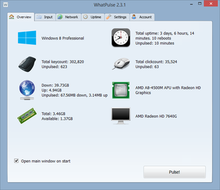This is an old revision of this page, as edited by Citation bot (talk | contribs) at 02:07, 27 September 2023 (Removed parameters. | Use this bot. Report bugs. | #UCB_CommandLine). The present address (URL) is a permanent link to this revision, which may differ significantly from the current revision.
Revision as of 02:07, 27 September 2023 by Citation bot (talk | contribs) (Removed parameters. | Use this bot. Report bugs. | #UCB_CommandLine)(diff) ← Previous revision | Latest revision (diff) | Newer revision → (diff)| This article relies excessively on references to primary sources. Please improve this article by adding secondary or tertiary sources. Find sources: "WhatPulse" – news · newspapers · books · scholar · JSTOR (July 2013) (Learn how and when to remove this message) |
 Screenshot from WhatPulse 2.3.1 Screenshot from WhatPulse 2.3.1 | |
| Developer(s) | Martijn Smit |
|---|---|
| Initial release | 6 February 2003; 21 years ago (2003-02-06) |
| Stable release | 5.2 / 6 March 2023; 21 months ago (2023-03-06) |
| Written in | C++ |
| Operating system | |
| Platform | Qt |
| Type | Usage statistics (Key & mouse click counting, bandwidth and uptime measuring) |
| License | Freeware |
| Website | whatpulse |
WhatPulse is a key-counting program that monitors computer uptime, bandwidth usage and the number of keystrokes and mouse clicks made by a user over a period of time. Unlike keyloggers, the authors claim WhatPulse does not record the order in which keys are pressed but instead counts the number of times keys are pressed. As of March 7, 2023, over 380,000+ users are active on WhatPulse.
Features
The software tracks a user's pressed keys, mouse clicks and used bandwidth and the uptime of the system. Periodically, the user can upload to the server the number of keystrokes made; this is called "pulsing". Users can see where they are in a leaderboard of people who have joined the program and compare themselves against people from their own countries. Users can also join teams, which enables them to compare themselves against people with similar interests.
The program also has anti-cheat measures in place. Automated measures against cheating include a 50 keys per second maximum.
Platform compatibility
WhatPulse is a freeware cross-platform application, running on Windows, macOS, and Linux. However, the Mac and Linux clients were not always updated as often as the Windows client. This changed in version 2.0, which became available for all platforms at the same time and aims at letting the client act the same across all platforms.
References
- "WhatPulse 5.2 is Here: New Features, Improvements, and More". March 6, 2023. Retrieved March 7, 2023.
- "Does WhatPulse contain any spyware?". WhatPulse.
- "Overall Statistics". WhatPulse. Retrieved 7 March 2023.
- "What does "Activity Breached" mean?". WhatPulse Wiki. Archived from the original on 12 November 2016. Retrieved 25 July 2013.
- "Downloads". WhatPulse.